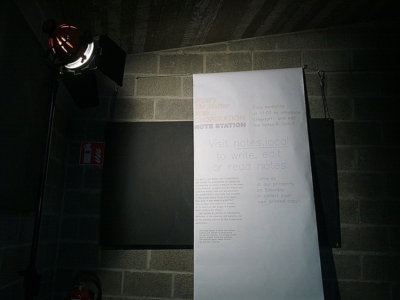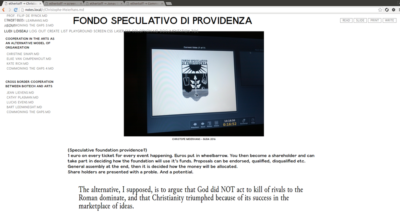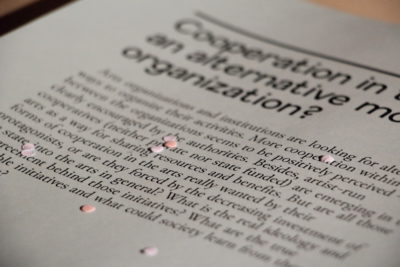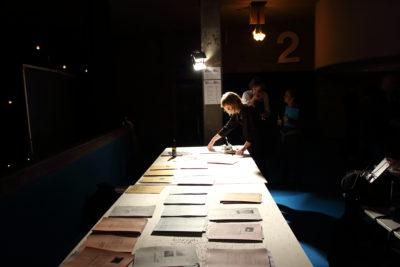What’s the Matter with Cooperation @ BUDA
What can we learn about our current society by looking at the increasing production of art works that are made in cooperation with their audience? And in reverse, how does the general raise of cooperative activism in the society influence the arts?
The art centre BUDA, located in the West Flemish city of Kortrijk, organised a three day festival around these questions: ‘What’s the matter with cooperation’. Reclaiming the idea of participation, people inside and outside the Arts do believe that one can take part in shaping the society. From the ‘emancipated spectator’ to the ‘empowered citizen’, BUDA was filled during 3 days with performances, lectures and co-learning situations that all implicitly and explicitly dealt with questions of cooperation.
Plotted instructions for the participants
OSP joined the festival to create in cooperation a publication, using the Ethertoff platform. We concentrated on the theoretical section of the festival: a series of lectures taking place in a makeshift forum. BUDA had constructed this forum space in its entrance hall especially for the event. OSP had setup a working station here. We projected the ethertoff install right next to where the lectures slides were projected, to lure attention to the tool and show there was activity there. As usual with Ethertoff, we designed live while the content was still being developed.
Screenshot of the ethertoff platform while editing was in progress
Ethertoff was first used in a similar context, to document the summer school Relearn. A marked difference this time was that a number of lecturers already provided a text beforehand, that we had already pasted into Ethertoff. In this way, the various editors that participated did not need to concentrate on just paraphrasing the lectures, but could spend their time annotating the lectures. Every morning started with a short workshop on the platform: how the etherpad collaborative works, the markdown syntax. But also to create a common understanding of how to treat the text, a common editing protocol.
The participants—most of them active in the milieu of the performing arts—where remarkably enthousiastic to participate in this editing process. We think this might have to do with the nature of performing arts, in which makers are always looking for new ways to deal with the ephemeral processes on which they work. To collaboratively create traces of a shared event makes sense more so then for the general public.
At the closing of the festival we organised a print party, where the participants eagerly took the (still laser-hot) papers out of Sarahs hands as she exited the elevator with the final chapters: we had underestimated the printing time. Everybody could learn how to use the ring binding system, and then collate and bind their own copy. We had created a stack of paper for each lecture, with the idea that one could pick and choose—it turned out everybody took everything.
You can download the PDF. There’s also a version without the coloured backgrounds, so you can print on coloured paper yourself.
A note on tooling: we installed Etherpad & -toff on a Raspberry Pi. It was a tiny bit slow, but very stable. We plugged it in to BUDA’s existing network infrastructure. This means the Ethertoff platform was not accessible from the general internet—only from inside BUDA. It’s great to have this self-contained unit, and not to be able to access the tools when you leave the space. Both for the notetakers and for us. It helps to combat a problem with the workflow: because it is a very free collaboration model, participants can always think: someone will do it later. Clear time constraints really help then. It also answers a question we always have after the event: who takes care of the website? We made it clear from the beginning that the tool would away at the end of the event with the unplugging of the Raspberry. What we did do, is create a HTML archive, next to the PDF—just like with the Relearn 2013 website.












